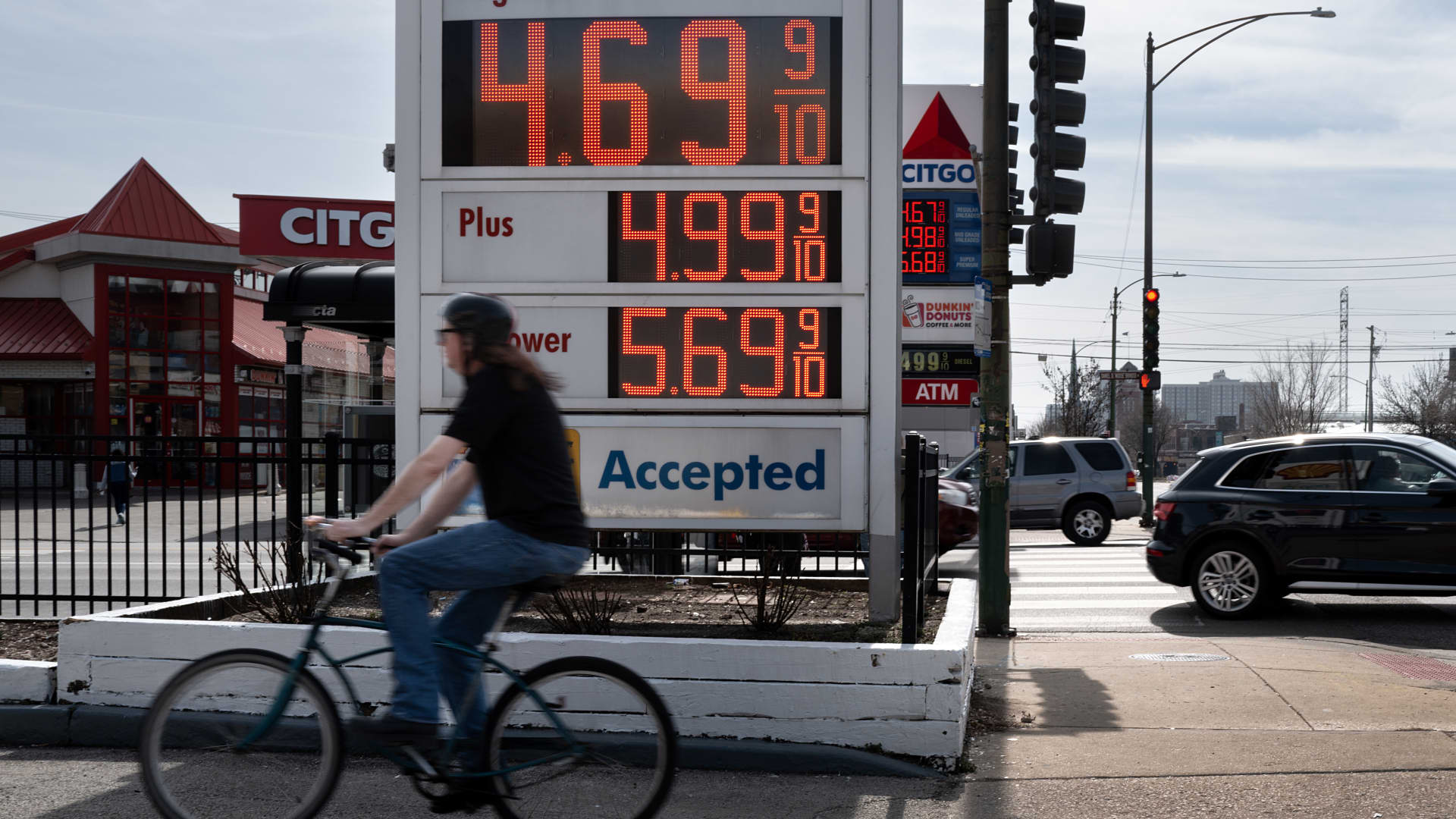Gas prices are displayed at a gas station on March 12, 2024 in Chicago, Illinois.
Scott Olson | Getty Images
A closely watched Labor Department report due Wednesday is expected to show that not much progress is being made in the battle to bring down inflation.
If so, that would be bad news for consumers, market participants and Federal Reserve officials, who are hoping price increases slow enough so that they can start gradually cutting interest rates later this year.
The consumer price index, which measures costs for a wide-ranging basket of goods and services across the $27.4 trillion U.S. economy, is expected to register increases of 0.3% both for the all-items measure as well as the core yardstick that excludes volatile food and energy.
On a 12-month basis that would put the inflation rates at 3.4% and 3.7%, respectively, a 0.2 percentage point increase in the headline rate from February, just a 0.1 percentage point decrease for the core rate, and both still a far cry from the central bank’s 2% target.
“We’re not headed there fast enough or convincing enough, and I think that’s what this report is going to show,” said Dan North, senior economist at Allianz Trade North America.
The report will be released at 8:30 a.m. ET.
Progress, but not enough
North said he expects Fed officials to view the report pretty much the same way, backing up comments they’ve been making for weeks that they need more evidence that inflation is convincingly on its way back to 2% before rate cuts can happen.
“Moving convincingly toward 2% doesn’t just mean hitting 2% for one month. It means hitting 2% or less for months and months in a row,” North said. “We’re a long way from that, and that’s probably what’s going to show tomorrow as well.”
To be sure, inflation has come down dramatically from its peak above 9% in June 2022. The Fed enacted 11 interest rate hikes form March 2022 to July 2023 totaling 5.25 percentage points for its benchmark overnight borrowing rate known as the federal funds rate.
But progress has been slow in the past several months. In fact, headline CPI has barely budged since the central bank stopped hiking, though core, which policymakers consider a better barometer of longer-term trends, has fallen about a percentage point.
While the Fed watches the CPI and other indicators, it focuses most on the Commerce Department’s personal consumption expenditures index, sometimes referred to as the PCE deflator. That showed headline inflation running at 2.5% and the core rate at 2.8% in February.
For their part, markets have grown nervous about the state of inflation and how it will affect rate policy. After scoring big gains to start the year, stocks have backed off over the past week or so, which have seen sharp swings as investors tried to make sense of the conflicting signals.
Earlier this year, traders in the fed funds futures market were pricing in the likelihood that the central bank would start reducing rates in March and continue for as many as seven cuts before the end of 2024. The latest pricing indicates that the cuts won’t start until at least June and not total more than three, assuming quarter-percentage point increments, according to the CME Group’s FedWatch calculations.
“I don’t see a whole lot here that is going to move things magically the way they want to go,” North said.
What to watch
There will be a few key areas to watch in Wednesday’s report.
Beyond the headline numbers, trends in items such as shelter, airfares and vehicle prices will be important. Those areas have been bellwethers during the current economic cycle, and moves either way could suggest longer-term trends.
Economists at Goldman Sachs expect outright declines across air travel-related items as well as vehicle sticker prices, and see smaller shelter cost increases, which make up about one-third of the CPI weighting. A New York Fed survey released Monday, however, showed a sharp uptick in expectations for rental costs over the next year, which is bad news for policymakers who frequently have cited decelerating housing costs as the cornerstone to their easing inflation thesis.
Similarly, the National Federation of Independent Business survey for March, released Tuesday, showed confidence among small businesses at its lowest level in more than 11 years, with owners citing inflation as their top concern.
“Inflation is cumulative, and that’s why prices still feel high,” North said. “People still can’t believe how high prices are.”
Gas prices also could play an important role in the CPI release after rising 3.8% in February. Though the gasoline index is relatively unchanged over the past two years, it’s still up more than 70% from April 2020 when the brief Covid-driven recession ended. Food is up about 23% during the same period.

 Finance1 week ago
Finance1 week ago
 Personal Finance1 week ago
Personal Finance1 week ago
 Blog Post1 week ago
Blog Post1 week ago
 Economics1 week ago
Economics1 week ago
 Personal Finance1 week ago
Personal Finance1 week ago
 Economics5 days ago
Economics5 days ago
 Accounting5 days ago
Accounting5 days ago
 Economics1 week ago
Economics1 week ago






















